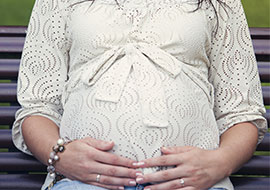Egg Donation
Egg donation at a glance
- Not all women will produce an egg that will result in pregnancy due to age, diminished ovarian reserve, endometriosis, or for unexplained reasons. For these women, egg donation is an excellent option for attempting pregnancy.
- Women who can carry a pregnancy but do not have healthy eggs may consider egg donation
- Egg donation has a high chance of resulting in a live birth and offers the woman the chance to carry and deliver a baby. It also may allow the woman to have a baby that is genetically related to her partner.
Looking to become an egg donor?
What is egg donation?
Egg donation is where one woman provides eggs to another woman so that the second woman can carry and deliver a baby.
Who should consider using donated eggs for fertility?
Any woman between 22 and 49 years old is a candidate, as long as they have medical clearance from our physicians. The typical person who seeks egg donation is a woman who has diminished ovarian reserve or premature ovarian failure.
How do I select a donor?

The most successful donors are those women under age 32, who have had no history of infertility, have had a child of their own and have donated eggs that resulted in a live birth. Most donors do not meet all of these criteria. At TRM, our egg donor screening requirements go above and beyond what is required by the FDA. Each of our egg donors is screened for more than 100 genetic conditions. Donors are screened by a psychologist trained in fertility related care and egg donation, to screen for abnormal behaviors, personality disorders and psychiatric diseases.
There are two ways to select a donor. A donor can be a friend, family member or acquaintance. This is called a known donor. Alternatively, you can opt for an anonymous donor. Each kind of egg donation has special ethical and emotional considerations.
You, your partner and the donor will need to have psychological counseling to ensure that everyone involved has thoroughly considered the moral and ethical dilemmas involved in this therapy.
TRM patients using donor eggs can now register and log directly into the donor portal, streamlining the egg donor selection process!
How likely am I to have a baby using donor eggs?
In general, the chances of live birth from egg donation range from 50-80 percent. There are very slight decreases in pregnancy rates as women reach their late 40s, which is probably due to subtle changes in the uterus.
“Having the option of using donated eggs is an incredible gift.”
What are the risks of using an egg donor?
Since egg donation involves the transfer of another person’s tissue (the egg turns into the embryo) there is a theoretical risk of contracting an infectious disease. However, to date, there are no documented infectious diseases transmitted via egg donation.
Despite all testing, there is still a chance of birth defects or other genetic disorders.
Approximately 5 percent of the women who receive egg-stimulating medication will not produce eggs or will not produce eggs of good enough quality to use.
Other risks of egg donation include:
- Fertilization of the donor eggs will not occur
- Embryos may not be viable
- Ectopic (tubal) pregnancy. For all IVF procedures, the risk is 2-4 percent.
- Multiple pregnancy (twins, triplets, or quadruplets). Multiple pregnancies may result in premature labor, increased incidence of birth defects, diabetes during pregnancy, and/or increased blood pressure during pregnancy.
What do I tell the baby when it gets older?
This is a very personal choice. Some couples will never tell a child or anyone else that they used donor eggs to conceive. The American Society of Reproductive Medicine has issued Gamete Donation: Deciding Whether to Tell, which we encourage our patients to read.
Related blog: Should You Tell Donor-Conceived Children Their Biologic Identity?
How much does egg donation cost?
The cost of an egg donor cycle varies depending on whether any services are covered by insurance, but is generally more expensive than undergoing a regular IVF cycle.
The cost of the treatment includes the medical, laboratory, and psychological screening of the egg donor, the medical procedures and medications for two patients, and compensation paid to the egg donor. We have an ample supply of donors ready to provide eggs.
Our financial counselor can supply you with a complete financial estimate for your specific treatment cycle.


